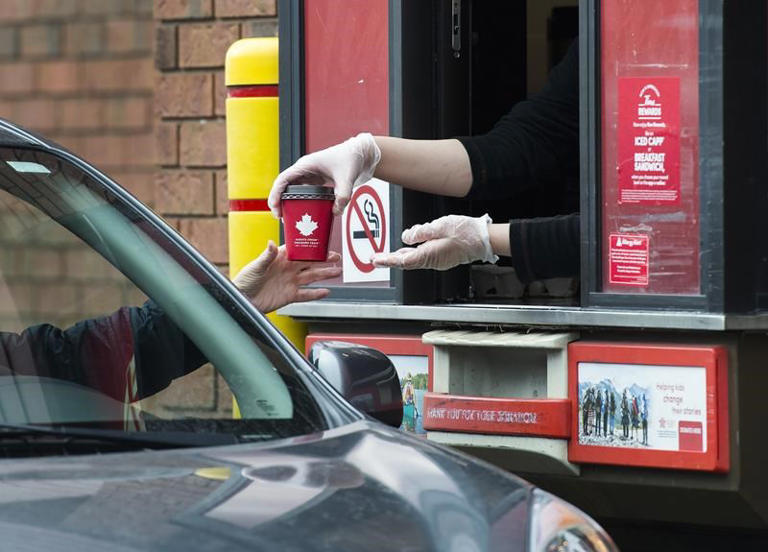Alberta
Tim Hortons app violated privacy laws in collection of ‘vast amounts’ of sensitive location data

People who downloaded the Tim Hortons app had their movements tracked and recorded every few minutes of every day, even when their app was not open, in violation of Canadian privacy laws, a joint investigation by federal and provincial privacy authorities has found.
The investigation concluded that Tim Hortons’ continual and vast collection of location information was not proportional to the benefits Tim Hortons may have hoped to gain from better targeted promotion of its coffee and other products.
The Office of the Privacy Commissioner of Canada, Commission d’accès à l’information du Québec, Office of the Information and Privacy Commissioner for British Columbia, and Office of the Information and Privacy Commissioner of Alberta issued their Report of Findings today.
The Tim Hortons app asked for permission to access the mobile device’s geolocation functions, but misled many users to believe information would only be accessed when the app was in use. In reality, the app tracked users as long as the device was on, continually collecting their location data.
The app also used location data to infer where users lived, where they worked, and whether they were travelling. It generated an “event” every time users entered or left a Tim Hortons competitor, a major sports venue, or their home or workplace.
The investigation uncovered that Tim Hortons continued to collect vast amounts of location data for a year after shelving plans to use it for targeted advertising, even though it had no legitimate need to do so.
The company says it only used aggregated location data in a limited way, to analyze user trends – for example, whether users switched to other coffee chains, and how users’ movements changed as the pandemic took hold.
While Tim Hortons stopped continually tracking users’ location in 2020, after the investigation was launched, that decision did not eliminate the risk of surveillance. The investigation found that Tim Hortons’ contract with an American third-party location services supplier contained language so vague and permissive that it would have allowed the company to sell “de-identified” location data for its own purposes.
There is a real risk that de-identified geolocation data could be re-identified. A research report by the Office of the Privacy Commissioner of Canada underscored how easily people can be identified by their movements.
Location data is highly sensitive because it can be used to infer where people live and work, reveal trips to medical clinics. It can be used to make deductions about religious beliefs, sexual preferences, social political affiliations and more.
Organizations must implement robust contractual safeguards to limit service providers’ use and disclosure of their app users’ information, including in de-identified form. Failure to do so could put those users at risk of having their data used by data aggregators in ways they never envisioned, including for detailed profiling.
The investigation also revealed that Tim Hortons lacked a robust privacy management program for the app, which would have allowed the company to identify and address many of the privacy contraventions the investigation found.
The four privacy authorities recommended that Tim Hortons:
- Delete any remaining location data and direct third-party service providers to do the same;
- Establish and maintain a privacy management program that: includes privacy impact assessments for the app and any other apps it launches; creates a process to ensure information collection is necessary and proportional to the privacy impacts identified; ensures that privacy communications are consistent with, and adequately explain app-related practices; and
- Report back with the details of measures it has taken to comply with the recommendations.
Tim Hortons agreed to implement the recommendations.
QUOTES
“Tim Hortons clearly crossed the line by amassing a huge amount of highly sensitive information about its customers. Following people’s movements every few minutes of every day was clearly an inappropriate form of surveillance. This case once again highlights the harms that can result from poorly designed technologies as well as the need for strong privacy laws to protect the rights of Canadians.”
“This report eloquently illustrates the risks inherent in the use of geolocation and the importance of transparent and accountable privacy practices. Without a suitable prior assessment, Tim Hortons collected sensitive information about its customers through its app, without their adequate knowledge or consent. It is to put an end to this kind of practice that Quebec has reviewed its legislation protecting personal information giving more powers to the Commission and making companies more accountable. ”
“This investigation sends a strong message to organizations that you can’t spy on your customers just because it fits in your marketing strategy. Not only is this kind of collection of information a violation of the law, it is a complete breach of customers’ trust. The good news in this case is that Tim Hortons has agreed to follow the recommendations we set out, and I hope other organizations can learn from the results of this investigation.”
“This investigation is yet another example where an organization has not effectively notified customers about its practices. Tim Hortons’ customers did not have adequate information to consent to the location tracking that was actually occurring. When people download and use these types of apps, it’s important that they know in advance what will happen to their personal information and that organizations follow through with their commitments.”
Alberta
Maxime Bernier says it’s ‘astounding’ Alberta is ‘pushing’ COVID boosters, tells Danielle Smith to stop it

From LifeSiteNews
The People’s Party of Canada leader tells the Alberta government: ‘It’s over! Get over it!’
People’s Party of Canada (PPC) leader Maxime Bernier said Alberta Premier Danielle Smith should tell provincial health bureaucrats to “back off” and stop “pushing” the mRNA COVID boosters on “anyone,” considering a recent announcement from health officials recommending yet more COVID shots.
“I find it astounding that Alberta public health bureaucrats are still pushing the mRNA boosters on anyone, and especially on children who have never been at risk, almost two years after almost all other pandemic measures have been ended,” Bernier told LifeSiteNews.
“Danielle Smith’s government should tell its bureaucrats to back off and stop stupidly feeding a needless sense of fear surrounding the virus that lingers among certain groups of society. It’s over! Get over it!”
Earlier this week, officials from Alberta Health Services (AHS), whose chief medical officer throughout the COVID crisis, Dr. Deena Hinshaw, was fired by Smith in 2022, updated its COVID booster recommendations to every “three months” starting at babies only six months old.
“Starting April 15, 2024, select groups of Albertans at high risk of severe outcomes from COVID-19 will be eligible for an additional dose,” the AHS noted on its website.
AHS health officials still assert that all “vaccines are safe, effective and save lives,” and that one can get a COVID shot at the same time as a flu vaccine.
On April 16, Bernier commented on the AHS’s new COVID jab guideline changes on X, in which he asked, “What’s going on in Alberta with their “conservative” government?
Bernier, who was a firm opponent of both the COVID shots and mandates, told LifeSiteNews that AHS’s recommendations are puzzling, given “more and more scientific evidence is emerging of dangerous side effects when injecting from these experimental substances.”
“Even though these are only recommendations, and nothing is mandated, this ‘guidance’ by government agencies influences people’s decisions,” Bernier said.
AHS claims that the booster shots “are anticipated to provide a good immune response against currently circulating strains.”
Those under 18 still need written or verbal consent from their parents to get the shot.
AHS is recommending booster jabs for seniors, healthcare workers as well as those with underlying medical conditions. They also recommend that First Nations people and “members of racialized and other equity-denied communities,” as well as pregnant women get the shots as well.
The COVID shots were heavily promoted by the federal government as well as all provincial governments in Canada, with the Alberta government under former Premier Jason Kenney being no exception.
The mRNA shots themselves have been linked to a multitude of negative and often severe side effects in children.
Danielle Smith took over from Kenney as leader of the United Conservative Party (UCP) on October 11, 2022, after winning the leadership. Kenney was ousted due to low approval ratings and for reneging on promises not to lock Alberta down as well as enacting a vaccine passport. Smith was opposed to COVID jab mandates.
Bernier: It’s ‘deplorable’ some provinces still mandate COVID shot for Heathcare workers
While Alberta does not mandate the COVID shots for healthcare workers anymore, British Columbia still does as well as some health regions in Ontario, a fact that Bernier called “deplorable.”
“I find it deplorable that nurses, doctors and other healthcare workers in B.C. and Ontario still have to be vaccinated to work in hospitals and that thousands of them have not been reintegrated,” Bernier told LifeSiteNews.
“The authoritarian covid measures adopted by all governments have been traumatic enough for millions of Canadians. All of them should be lifted.”
Last year, LifeSiteNews reported on how the details of the Canadian federal government’s COVID-19 vaccine contract with Pfizer for millions of doses of the mRNA-based experimental shots were recently disclosed after being hidden for over three years.
The contract with Pfizer shows the government agreed to accept the unknown long-term safety and efficacy of the shots. The details of the Pfizer contract do not disclose how much the government spent on the jabs.
A bill introduced by Conservative Party leader Pierre Poilievre that would have given Canadians back their “bodily autonomy” by banning future jab mandates was voted down last year after Trudeau’s Liberals and other parties rejected it.
Adverse effects from the first round of COVID shots have resulted in a growing number of Canadians filing for financial compensation over injuries from the jabs via the federal Vaccine Injury Program (VISP).
VISP has already paid well over $11 million to those injured by COVID injections.
Earlier this year, LifeSiteNews reported on how officials from Health Canada have admitted that there is “residual plasmid DNA” in the COVID shots after a Conservative MP asked the agency through an official information request if the DNA fragments were in the shots.
As for Bernier, earlier this month he called out Poilievre for dodging a question regarding Canada’s participation in the United Nations’ pro-abortion Paris Climate Agreement.
Throughout most of the COVID crisis, Canadians from coast to coast were faced with COVID mandates, including jab dictates, put in place by both the provincial and federal governments.
After much pushback, thanks to the Freedom Convoy, most provincial mandates were eliminated by the summer of 2022.
There are currently multiple ongoing class-action lawsuits filed by Canadians adversely affected by COVID mandates.
Alberta
Canada’s advantage as the world’s demand for plastic continues to grow

From the Canadian Energy Centre
By Will Gibson
‘The demand for plastics reflects how essential they are in our lives’
From the clothes on your back to the containers for household products to the pipes and insulation in your home, plastics are interwoven into the fabric of day-to-day life for most Canadians.
And that reliance is projected to grow both in Canada and around the world in the next three decades
The Global Plastics Outlook, published by the Paris-based Organization for Economic Co-operation and Development (OECD), forecasts the use of plastics globally will nearly triple by 2060, driven by economic and population growth.
The use of plastics is projected to double in OECD countries like Canada, the United States and European nations, but the largest increases will take place in Asia and Africa.
“The demand for plastics reflects how essential they are in our lives, whether it is packaging, textiles, building materials or medical equipment,” says Christa Seaman, vice-president, plastics with the Chemical Industry Association of Canada (CIAC), which represents Canada’s plastics producers.
She says as countries look to meet climate and sustainability goals, demand for plastic will grow.
“Plastics in the market today demonstrate their value to our society. Plastics are used to make critical components for solar panels and wind turbines. But they also can play a role in reducing weight in transportation or in ensuring goods that are transported have less weight in their packaging or in their products.”
Canada produces about $35 billion worth of plastic resin and plastic products per year, or over five per cent of Canadian manufacturing sales, according to a 2019 report published by the federal government.
Seaman says Canadian plastic producers have competitive advantages that position them to grow as demand rises at home and abroad. In Alberta, a key opportunity is the abundant supply of natural gas used to make plastic resin.
“As industry and consumer expectations shift for production to reduce emissions, Canada, and particularly Alberta, are extremely well placed to meet increased demand thanks to its supply of low-carbon feedstock. Going forward, production with less emissions is going to be important for companies,” Seaman says.
“You can see that with Dow Chemical’s decision to spend $8.8 billion on a net zero facility in Alberta.”
While modern life would not be possible without plastics, the CIAC says there needs to be better post-use management of plastic products including advanced recycling, or a so-called “circular economy” where plastics are seen as a resource or feedstock for new products, not a waste.
Some companies have already started making significant investments to generate recyclable plastics.
For example, Inter Pipeline Ltd.’s $4.3 billion Heartland Petrochemical Complex near Edmonton started operating in 2023. It produces a recyclable plastic called polypropylene from propane, with 65 per cent lower emissions than the global average thanks to the facility’s integrated design.
Achieving a circular economy – where 90 per cent of post-consumer plastic waste is diverted or recycled – would benefit Canada’s economy, according to the CIAC.
A Deloitte study, commissioned by Environment & Climate Change Canada, estimated diverting or reusing 90 per cent of post-consumer plastic waste by 2030 will save $500 million annually while creating 42,000 direct and indirect jobs. It would also cut Canada’s annual CO2 emissions by 1.8 megatonnes.
Right now, about 85 per cent of plastics end up in Canada’s landfills. To reach the 90 per cent diversion rate, Seaman says Canada must improve its infrastructure to collect and process the plastic waste currently being landfilled.
But she also says the industry rather than municipalities need to take responsibility for recycling plastic waste.
“This concept is referred to as extended producer responsibility. Municipalities have the responsibility for managing recycling within a waste management system. Given the competing costs and priorities, they don’t have the incentive to invest into recycling infrastructure when landfill space was the most cost-effective solution for them,” she says.
“Putting that responsibility on the producers who put the products on the market makes the most sense…The industry is adapting, and we hope government policy will recognize this opportunity for Canada to meet our climate goals while growing our economy.”
-

 Economy1 day ago
Economy1 day agoExtreme Weather and Climate Change
-

 Freedom Convoy2 days ago
Freedom Convoy2 days agoTrudeau’s use of Emergencies Act has cost taxpayers $73 million thus far
-

 Jordan Peterson2 days ago
Jordan Peterson2 days agoJordan Peterson slams CBC for only interviewing pro-LGBT doctors about UK report on child ‘sex changes’
-

 Agriculture2 days ago
Agriculture2 days agoBill C-282, now in the Senate, risks holding back other economic sectors and further burdening consumers
-

 International1 day ago
International1 day agoTelegram founder tells Tucker Carlson that US intel agents tried to spy on user messages
-

 Addictions2 days ago
Addictions2 days agoLiberal MP blasts Trudeau-backed ‘safe supply’ drug programs, linking them to ‘chaos’ in cities
-

 Frontier Centre for Public Policy2 days ago
Frontier Centre for Public Policy2 days agoThe Smallwood solution
-

 Alberta1 day ago
Alberta1 day agoDanielle Smith warns arsonists who start wildfires in Alberta that they will be held accountable






